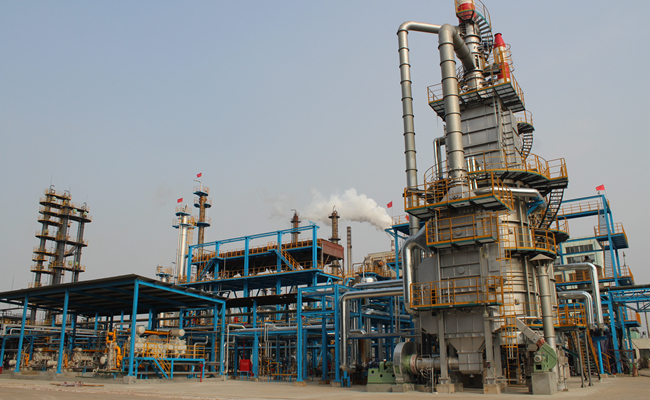The ultra-deep desulfurization of gasoline technology was industrialized at Shandong Hengyuan Petrochemical Co. Ltd. to produce the China-V standard (Europe V) gasoline with a capacity of 400,000 t/a. The technology is developed by Dalian Institute of Chemical Physics (DICP), cooperated with Shaanxi Yanchang Petroleum Co. Ltd.

The Ultra-deep Desulfurization Process for Clean Gasoline Production Commercial Unit (Image by LIU Tiefeng)
This process is based on the fixed-bed ultra-deep adsorptive desulfurization combination technology (YD-CADS Technology) developed by DICP, and its pilot test was successfully demonstrated at Yongping Refinery in 2014 cooperated with Shaanxi Yanchang Petroleum Co. Ltd. The YD-CADS technology was developed based on the fundamental research for more than a decade conducted by the research team led by Prof. LI Can and Prof. JIANG Zongxuan from DICP. This technology has been recognized as an innovation with independent intellectual property rights.
China is facing a great challenge in resolving the air pollution problems. The heavy air pollution consequently resulting the large-area hazy weather frequently appeared in recent years, are mainly caused by over relied on fossil resources in energy supply. The automobile exhaustion is one of the main causes for the air pollution. The Chinese government has determined to solve the air pollution problems. Hence, to develop the technology for producing clean fuel is greatly urgent and is the responsibility for scientists to improve the ecological environment by developing the advanced technologies.
The successful development and industrialization of the YD-CARDs technology has made a great contribution in producing clean fuel, especially provided a new technology route for the upgrading of small and medium size oil refinery industry widespread distributed in China. More importantly, it will promote the prevention and control of air pollution, resulting the potential economic and social benefits. (Text by JIANG Zongxuan /Image by LIU Tiefeng)
Contact:
Prof LI Can
Dalian Institute of Chemical Physics, Chinese Academy of Sciences,
457 Zhongshan Road, Dalian, 116023, China,
Tel: 86-411-84379070,
E-mail: canli@dicp.ac.cn